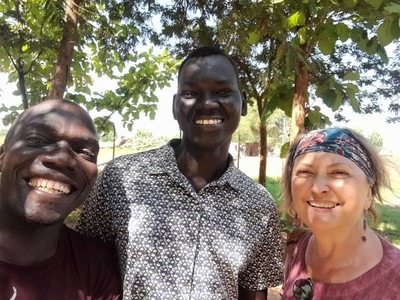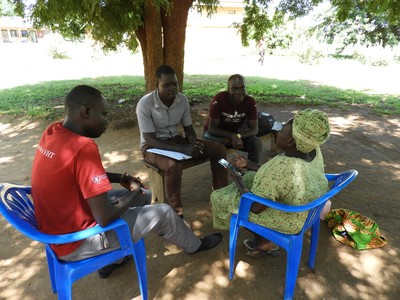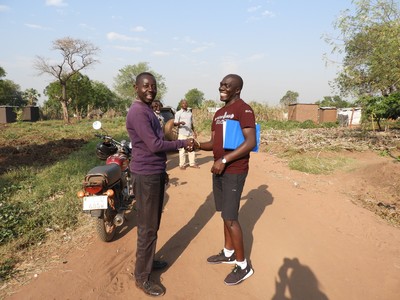
Cancer Care in Humanitarian Crises: Insights from Gaza and Sudan
![]() Cameron Don
Cameron Don
![]() 18th October 2024
18th October 2024
Authors: Nahla Gafer and Heba Elsawahli
Nahla Gafer and Heba Elsawahli report from the World Cancer Congress, where they and Dr Mhoira Leng presented on the challenges of cancer care in communities broken by conflict. Firsthand accounts from Gaza present a desperate situation for healthcare workers, fighting to treat people amidst extreme violence and destruction. Examination of Sudan highlights the fragility of health when conflict breaks out, and how quickly circumstances can change.
They discuss the innovative solutions healthcare workers are finding to continue treating their patients and present their recommendations and a call to action for improving cancer care in humanitarian crises.
During the World Cancer Congress held in Geneva from the 17th to 19th of September 2024, I had the privilege of presenting alongside my esteemed colleague, Dr. Mhoira E. F. Leng the critical state of cancer care amidst conflict and humanitarian crises in Gaza and Sudan. The congress is an initiative of the Union for International Cancer Control (UICC) to unite and support the cancer community in its efforts to reduce the global cancer burden, promote greater equity, and ensure that cancer control remains a priority on the international health and development agenda. It was a gathering of experts, and influential leaders in cancer control besides rising professionals and researchers from all the regions. Palliative care was at the heart of many discussions either as part of cancer treatment or as part of the experiences of people living with cancer. The sessions brought diverse inputs about the challenges and opportunities to emphasize the right to palliative care within different contexts. Our discussions underscored the profound challenges faced by patients and healthcare providers in war-torn regions and highlighted the urgent need for innovative solutions and international solidarity to address the suffering of vulnerable populations.
Gaza: A City in Ruins
“Come with me to Rafah, where the heart-wrenching reality unfolds before us: long queues of trucks, a cemetery surrounded by tents, and the desperate need for water carried by donkeys. The destruction extends even to ambulances, the very lifelines meant to save lives. Here, children are left without schools, robbed of their innocence and future, with nearly 14,000 young lives lost—each one a tragedy to mourn. The staggering statistic of 70% of the casualties being children haunts us. We grapple with the shocking numbers: 100,000 injured and 34,000 dead, which would equate to 85,600 lives lost in Scotland and over 262,000 in the UK. This is not just a distant conflict; it is a human catastrophe. We stand witness to a plausible genocide, where starvation is wielded as a weapon of war, violating the very laws meant to protect humanity. Yet, in the face of this madness, who will rise to stop the tide of suffering? This is a crisis that makes us all less safe, revealing a humanity that is fractured and in desperate need of healing.”
Dr. Leng's presentation focused on the dire circumstances in Gaza, where the ongoing conflict has transformed a vibrant city into a landscape of devastation. Testimonies from local healthcare workers and patients conveyed a heartbreaking narrative of loss, destruction, and an overwhelming sense of despair. A poignant message from pharmacist Suha Suleiman captured the spirit of determination amidst chaos: “Despite the pain, hope persists. We are determined to give and provide service to cancer patients despite all circumstances.” Healthcare professionals in Gaza, including oncologists, face insurmountable challenges as they strive to provide care under life-threatening situations. Many have been injured or killed while performing their duties, and the destruction of healthcare facilities exacerbates the crisis. Dr. Leng highlighted a case involving a 34-year-old civil engineer diagnosed with follicular lymphoma who waited four months for a referral to no avail. He received excellent palliative care from trained colleagues, yet unfortunately, no active treatment was possible for his “curable disease.” This example underscores the critical need for timely intervention in cancer care, which is often compromised during prolonged conflicts.
We are actively fundraising for our partners in Sudan, please see the donations section on our website to donate to this project.
Sudan: The Struggle for Survival
In a similar manner, I addressed the challenges faced by cancer patients and healthcare professionals in Sudan during wartime. A sudden outbreak of war leaves people unprepared. Those who were on the streets on the 15th of April lost their lives, others were cut off from their homes for days or weeks. Some had to leave their homes without their IDs, certificates or savings. Houses were ransacked, buildings destroyed, and many lost their homes, savings, and jobs.
The conflict has severely disrupted healthcare services: during the first two weeks of war 26 hospitals were bombed in the capital. People moved to safer areas, where the infrastructure was poor, and prices skyrocketed for essentials like food, housing, and medical care. Rent for a one-room house with no windows cost four months' salary, while radiotherapy, available at only one centre in the entire country, cost 50 times the average salary. Healthcare workers experience a cessation of salaries and increased living expenses, leaving them feeling helpless in the face of patients' needs as well as themselves being a target. Cancer management is significantly impacted by these circumstances, as timely treatments and specific interventions become inaccessible. Cancer patients who were free from clinical evidence of disease and were on their way to cure, developed recurrences and metastasis. Doctors reported more side effects and deaths from in patients receiving chemotherapy, mainly because of the poor physique of the bodies, torn by lack of food and psychological stress.
Innovative Solutions Amidst Adversity - Networking and Telehealth
Despite the overwhelming challenges, innovative practices have emerged in both Gaza and Sudan. Networking among healthcare providers has fostered collaboration and support. Through online platforms, healthcare workers share psychological, material, and consultancy resources to cope with the trauma of war. Telehealth has also become an essential tool, enabling healthcare professionals to guide patients and provide care remotely. This adaptation has allowed oncologists to offer necessary support and reassurance to patients navigating their treatment options amidst chaos.
Similarly, healthcare providers in Sudan have utilized telehealth to maintain connections with patients. Oncologists are encouraged to think creatively when faced with deficiencies in available services. For instance, they may rely on ultrasounds and chest X-rays instead of CT scans or make clinical diagnoses when imaging is unavailable. Such adaptations are vital in ensuring that cancer patients receive the necessary care, even when resources are scarce.
Cancer in Conflict: The Lived Experience
The voices of people living with cancer, their families, and caregivers should be amplified in these critical times when human lives are reduced to figures and numbers. Our efforts to describe and call for action to address the catastrophes of the situations in Gaza and Sudan are incomplete without listening to those enduring the pain. In the preparations for the World Cancer Congress, a cancer survivor from Gaza who evacuated to Egypt was invited to different panels to showcase and bring evidence about what she went through in Gaza. However, she was not granted the visa to participate in person, which prompts further questions about the situation of the needed international solidarity. The shared message from the Gaza cancer survivor reaffirmed the need for peace as the best medicine for cancer patients. Ensuring the safety of humanitarian, healthcare, and aid workers during wartime and holding parties accountable for targeting healthcare centers are essential to providing cancer care including palliative care. She also mentioned the importance of coordinating efforts to value the lives of cancer patients through evacuation to centers abroad that continue providing desperately needed care. She emphasized that cancer patients usually suffer from other comorbidities and require at least one person from their family to support them. She called on resuming efforts similar to helping childhood cancer patients that happened earlier in the year but stopped in line with the increasing aggression.
Recommendations:
1. Medical Treatment and Protocols
- Prioritize the use of medications that require less frequent dosing to ensure better management in crisis settings.
- Adapt treatment approaches to available resources during emergencies, allowing for flexibility in care delivery.
- Strengthen systems to procure and distribute essential medications, particularly controlled substances like opioids.
- Guarantee that medications and funds are distributed to those in genuine need, preventing exploitation by privileged individuals or those in power.
2. Healthcare Infrastructure and Continuity
- Focus on building healthcare structures and securing medications for the larger population, rather than relying on evacuating a select few.
- Spread healthcare infrastructure and capacity across multiple cities to prevent over-reliance on a single location in times of crisis.
- Maintain patient care throughout conflict by developing resilient systems that can function even in times of disruption.
- Ensure that palliative care is an integral part of healthcare responses in emergencies, providing holistic support for patients with life-limiting conditions.
- Recognize and prioritize the management of chronic diseases, ensuring they are not neglected during humanitarian crises.
3. Support for Healthcare Workers
• Implement role-making and task-shifting strategies, empowering healthcare staff to take on varied responsibilities, and ensuring continuity of care.
• Provide essential living support for medical staff, including shelter, food, and salaries to sustain their ability to work.
• Offer mental health support to both healthcare workers and patients to address trauma and stress caused by conflict.
• Ensure the protection of medical staff and healthcare facilities, safeguarding them from harm during conflict.
• Facilitate the entry of healthcare workers from abroad who are willing to support patients on the ground.
4. Communication and Collaboration
• Foster strong communication networks among healthcare providers, patients, and staff to ensure care can be coordinated during crises.
• Use telehealth and digital platforms to provide support, education, and consultation, especially in remote or conflict-affected areas.
• Build alliances and coalitions that bring together stakeholders for coordinated efforts in healthcare delivery during emergencies.
• Promote collaborative working relationships that respect and empower local leadership and expertise in healthcare.
5. Advocacy and Policy
• Call for the cessation of wars to protect lives and maintain healthcare systems.
• Call for implementing accountability measures following the targeting of hospitals and healthcare centres.
• Uphold the values of palliative care as a fundamental right, ensuring that these principles are applied universally.
The Call for Action
As healthcare providers grapple with the complexities of delivering cancer care in conflict zones, it is imperative to acknowledge that the challenges faced extend beyond the disease itself, encompassing issues of human dignity and compassion. Our presentations stand as a poignant testament to the resilience of healthcare workers and the significance of solidarity during times of crisis.
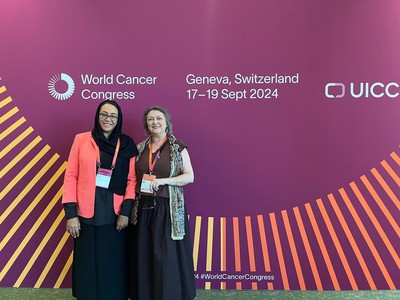
Nahla and Mhoira at the WCC

Nahla and Mhoira with the Director of Mauritania's Cancer Centre
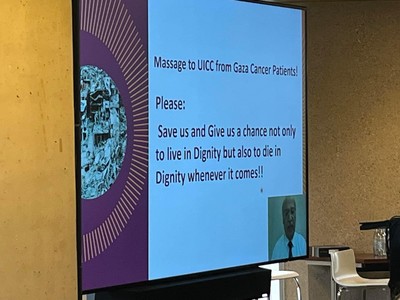
Plea from Dr Sobhi Skaik on behalf of Gaza's cancer patients
Meet the Scholars: Liz Nabirye
![]() Cameron Don
Cameron Don
![]() 15th October 2024
15th October 2024
Meet Liz Nabirye, one of our newest Cairdeas scholars! Liz has worked with Dr Mhoira Leng for around 15 years and is the Clinical Lead for the Palliative Care Education and Research Consortium (PcERC). Liz is currently undertaking a Master’s Degree in Palliative Care at Makerere University. A highly experienced palliative care clinician, and a compassionate, generous person, we are delighted to be working with Liz as she furthers her education in palliative care.
We asked her to share a little about herself and her experience as a Cairdeas scholar so our supporters could get to know her better.
“I have worked in palliative care for 23 years and I strongly believe that my career development will greatly impact the lives of others through my role as a clinician, a trainer and upcoming researcher. As a clinical lead, I am involved in providing specialised holistic person-centred care to children and adults with life limiting illnesses with a goal of improving their quality of life and that of their families. Pursuing a Master’s Degree in Palliative Care was a dream come true through a scholarship granted to me from Cairdeas International Trust and I am very grateful for the offer.”
Liz also provided us with some details of what her work and studies involve, highlighting the importance of collaboration and mentoring,
“To ensure continuity and sustainability I am involved in knowledge and skills transfer through education and training of both nursing and medical students at different levels with ongoing clinical modelling. Doing this Master’s in Palliative Care will greatly enhance my research skills which are needed to ensure evidence-based practices. It was indeed very humbling and gratifying to win this Cairdeas scholarship for my master’s program.
I currently provide palliative care services in the Mulago National Referral Hospital and Kiruddu Referral Hospitals, which serve as training hospitals for both under and post-graduate students of the College of Health Sciences, Makerere University. I participate in teaching and mentorship of students rotating in the palliative care service, aimed at building capacity and a critical mass of palliative care leaders to integrate good practises in the health systems in their settings.”
Throughout these reflections, Liz’s passion for teaching and mentoring the next generation of palliative care clinicians shone through, as she elaborates,
“One of my most significant career aspirations is to take on a mentorship role within the organization. Throughout my career journey, I have benefited greatly from the guidance and support of mentorship and this has helped me develop both professionally and personally. I aspire to become a mentor to junior colleagues and assist them in their career growth by sharing my knowledge and experiences. I hope to inspire and empower others to reach their full potential and contribute to a more dynamic and skilled workforce in palliative care.”
Finally, Liz reflects on the skills she is developing through her Master’s studies,
“This MSc in Palliative Care will enhance my knowledge and skills in: providing clinical skills, advocacy and research within national government hospital and promoting integrated palliative care approaches and principles in the already existing systems so as to improve quality of care and life for those in need.”
We are very grateful to Liz for taking the time to help us and our supporters get to know her better and wish her great success with her studies and further career in palliative care!
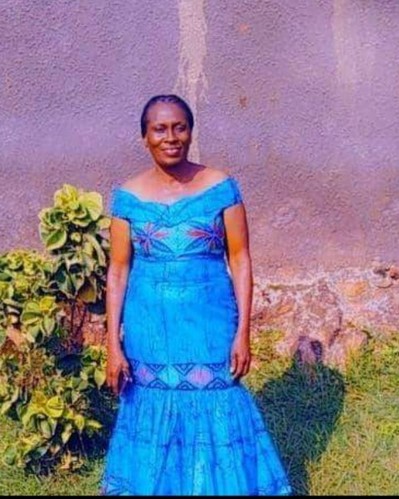
Liz Nabirye
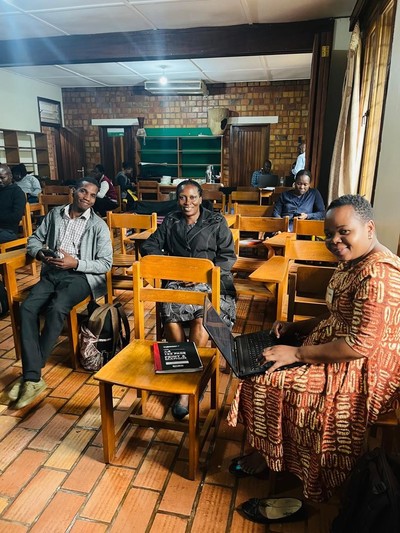
Liz with her classmates during the face to face block
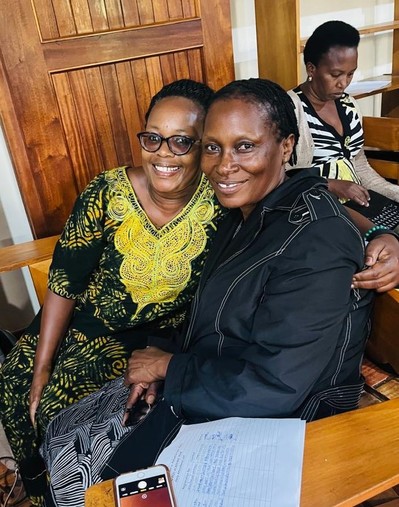
All smiles!
Palliative Care in Fragile Communities: Dr Mhoira Leng et al Recognised for Newly Published Paper by European Association for Palliative Care
![]() Cameron Don
Cameron Don
![]() 9th October 2024
9th October 2024
We are delighted to share the publication of Dr Mhoira Leng's paper 'Evaluation of the integration of palliative care in a fragile setting amongst host and refugee communities: Using consecutive rapid participatory appraisals.’ Written in collaboration with several other authors, listed below, this publication is the result of much hard work by Mhoira and her team, and we are extremely proud of them!
The paper seeks to evaluate the integration of palliative care into conflict-affected communities, through studying one such community in Northern Uganda. The paper comes as a result of over 4 years of work, and involved close collaboration with local Village Health Teams. Utilising observation, interviews and document reviews, the paper identifies community engagement and training as key components for integrating palliative care into the health system of such communities.
Such research is increasingly important in improving access to palliative care, as conflict and climate change continue to displace millions of people globally. Differing cultural beliefs and stigmas surrounding health and illness remain a key challenge as people are forced to flee their homes in search of safety, and research such as this will help to bridge the gap between host and refuge populations and improve their access to palliative care.
Furthermore, Dr Leng’s paper has been recognised by the European Association for Palliative Care, being selected as their September Palliative Medicine Editor’s Choice. Huge congratulations go to all the team involved in the writing and publication! Read the EAPC blog on the paper here, or read the editorial discussing this and other papers here.
Contributing authors include: Julia Downing, Gursaran Purewal, Liz Namukwaya, Vicky Opia, Chitra Venkateswaran, Elizabeth Nabirye & Peace Bagasha.
